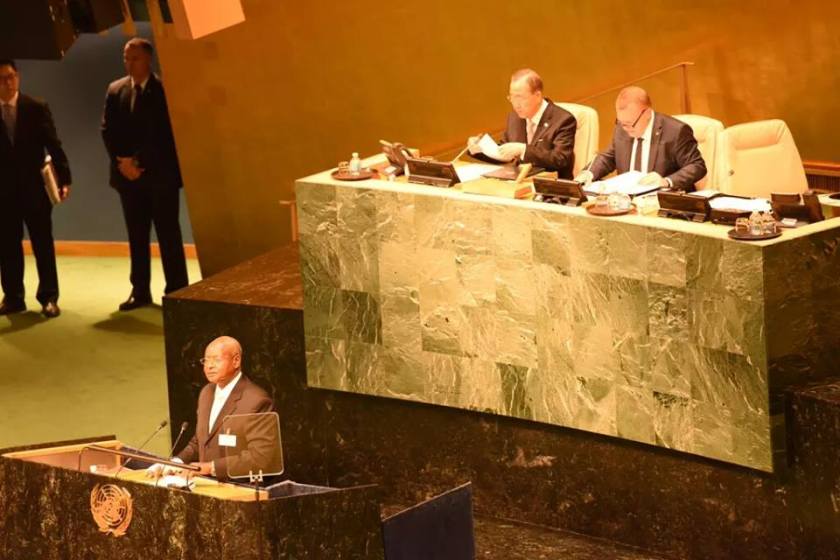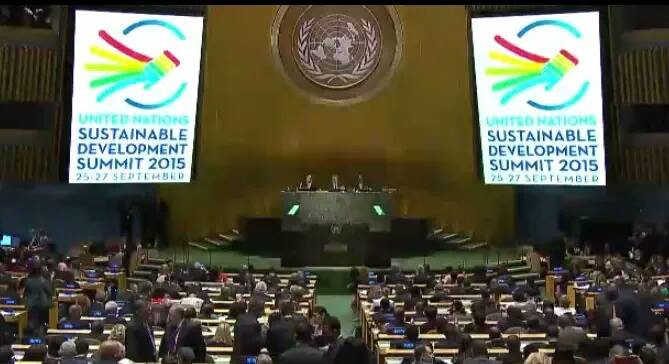
Dear Sir Honorable Joseph Nkaissery!
I write to you again, I know it’s been a month or so, but the actions have to be questioned and the liability of the actions you do Honourable Minister or Cabinet Secretary of the Ministry of Interior Affairs and Coordination of National Government. You have an ability of making decisions that area allowed to be questioned.
I am not writing to you because I am not defending terrorism, because I am not, the Garissa University attack, the Lamu Attack and Westgate attack in Nairobi was sad and unfortunate as innocent Kenyans died while Islamist, went in and killed without impunity; that has to be answered and those actions should not control the agenda of the country, but give way to the liberties and freedoms that the citizens are rights to have. While the Government finds ways of charging and hunting down the men who are behind these hideous crimes.

But, the use of Terrorism to close down Daadab Refugee Camp seems a bit premature.
As this was even stated by academics on the matter in 2014:
“The speaker said that the Dadaab Camp is not an engine for radicalization; rather, it is an engine of moderation. Poverty and displacement do not automatically lead to radicalization. There is a growing need for more anthropological research on the topic. An entire generation has grown up in peace; it is not scarred by war” (…)”More political and economic analysis is needed on this issue. The Kenyans claim to be in charge but al Shabaab remains everywhere. The Kenyans do not have the level of control that they claim. A lot of the radicalism that is currently being seen in Mombasa is very local. Al-Shabaab is also present in Nairobi. Many al-Shabaab suspects are Kenyan nationals. Terrorism is a wider, urban East African problem” (Rawlence, 2014).
So if the man behind Open Society have claims two years ago that can counter your arguments now for closing, can you bring evidence can show that Rawlence is totally wrong, please honourable Sir?
Hon. Joseph Nkaissery I hate to do this as this is your set of laws and the ones that set the guidelines for your government until you get the National Assembly or Parliament to change it with a general vote.

So for now the law of Kenyan Refugee Act of 2006 says this:
“18. No Person shall be refused entry into Kenya, expelled, extradited from Kenya or returned to any other country or to subject any similar measure if, as result of such refusal, expulsion, return or other measure, such person is compelled to return or remain in the country where –
- The person may be subject to prosecution on account of race, religion, nationality, membership of a particular social group or public opinion;
- The person’s life, physical integrity or liberty would be threatened on account of external aggression, occupation, foreign domination or events seriously disturbing public order in part of whole of that country”.
The law is clear and doesn’t seem that it is too important for you, if these laws is still applied then the closure still gives them rights as Refugees or as legal persons in the territory where you are the Cabinet Ministry Nkaissery. I know that shouldn’t be too much to ask that the Kenyan Government are following the laws of the land? Of does this not apply to the refugees and the ones that have left Somalia, Ethiopia or South Sudan because of oppression and aggression there?
In 2015 John Kerry and the United States pledged $40m directly to the Refugee Camps, so they must have had a say in the planned closure you had of the camps last year, with the new idea of trying to do it again.

Here is his latest statement to you Hon. Nkaissery:
“We strongly urge the Government of Kenya to maintain its longstanding leadership role in protecting and sheltering victims of violence and trauma, consistent with its international obligations. We call on Kenya to uphold these international obligations and not forcibly repatriate refugees” (…)”We call on Kenya to continue its support for refugees and voluntary return efforts, and to continue to work with UNHCR and partner nations to find durable solutions that respect humanitarian standards and uphold international law. We also urge the Government of Kenya to honor its responsibilities, including the 2013 Tripartite Agreement on the voluntary repatriation of Somali refugees living in Kenya” (…)”We remain committed to working with Kenya to support voluntary returns that are safe, dignified and consistent with international law, as well as helping Kenya to address security concerns presented by al-Shabaab and other extremist groups” (Kerry, 2016).
So Honourable Minister CS. John Nkaissery, you have lots of responsibility and have to swallow lots of crap in your days in office, while Deputy President William Ruto and President Uhuru Kenyatta got to do the fun stuff and sign decrees and words into laws. You have to clean up behind the scenes and act upon the ideas these two men have. So I am sure the stress is coming to you and therefore is so seldom that the pundits and public see you charming smile.

We are not at the point that the Terrorism claim, I don’t feel you can validate that as a reason for the closure of the camp, unless you have evidence you send to me Hon. Nkaissery. I am an advisory, but until I am proven wrong, I will not change my mind. As you are playing your cards this way, is to try filtering the world away from assassination plot that we’re on Jacob Juma or is the something else you want the world to forget? The Pre-Election violence twice in Nairobi under Nairobi Metropolitan Police Commander Japhet Koome towards the Cord Demonstrations, is this right or am I wrong hon. Nkaissery?
But to get back to reality and not the conspiracies that might run as the Kenyan Government said they would close the Refugee Camps last year in 2015. When as I said United States Government pledged more money to run them and filter it through the United Nations programs.
Seems more like this is a way of scaring the international groups, multinational organizations and all to give direct funds to Kenyan Government instead of taking it direct to the Refugee Camp. If not I hope you get a Task Force that really looks into your allegations and also delivers the findings so they can be looked through and are more believable than the financials from Donald Trump.
There are questions that remains Hon. Nkaissery because the issues and the rights, even the laws that are still viable and official guidelines for the refugees and citizens in Kenya, make a brother like me question the rhetoric you have used and arguments. So please take care of the action you do. This here will be greater stain on the Jubilee Alliance Party (JAP), and you don’t want that as a Cabinet Secretary that creates tensions with the allies abroad that both gives your army funding and equipment together with direct budget aid. That would not be wise… Though I understand Hon. Nkaissery that you care about the refugees and their safety even if you close them; because for many of them have been living there for a long time and they could be by many means Kenyan citizens with Somali ethnicity for instance.

Would you clear the Kibera slum and the areas around as the Rawlence claimed that the terrorist and extremist was more likely in Urban areas, and Kibera is Urban and also uncontrolled in some ways. So why are you not focused on the development of Kibera that you have Dr. Evan Kidero, the loyal Governor can access the situation for you and find ways to monitor the extremist that might be trained there? Because, if a so-called expert Rawlence can be some people who becomes violent in urban areas, and that is not politely the Dadaab Refugee Camp. So it must be more political than actual be the reason for the closing as they either want to show character or independence over the Multi-National Organization and the International donors, as a sovereign state.
Hon. Nkaissery, we both know that Kenya is a Sovereign State and because of that have freedoms to do what they want on their territory, but they have international obligation. You and I know that Kenya has internal laws and also have to keep their international laws considering the rights of refugees. Still, you can act this way, but will you consider the implications and the ramifications of this. Even if the European states are considering and signing agreements to ship the Syrian Refugees from Greece, to Turkey; that does not send direct flight back to Palmyra, Syria, as much as you don’t want to be remembered for sending back Somali Refugees from Dadaaab Refugee Camp to hostels in Mogadishu, Somalia. Or will you?

I am just worried for these innocent fleeing human beings who has fled their homeland for safety in Kenya, as much as I am worried for the Syrian who are fleeing to Greece and being transported to Turkey. I condemn that and would condemn if the Kenyan transport these men and woman to Mogadishu in the midst of fighting and continuation of AMISOM mission in Somalia.
I know I am nobody, but I had to address it and ask you why you want to, as I also question quickly the biggest argument for closing. As I don’t believe until there are serious report and evidence of the terrorism threat from Dadaab Refugee Camp, and why you don’t check more Kibera slums of Nairobi, but that would hurt your pride, right? Wouldn’t it Hon. Nkaissery, or am I wrong?
Peace.
Best Regard
Write of Minbane.
Reference:
Rawlence, Ben – ‘Somali Refugees in Kenya: The Case of the Dadaab Camp’ (08.05.2014) link: https://www.chathamhouse.org/sites/files/chathamhouse/field/field_document/2014Somali%20Refugees%20in%20Kenya.pdf
Kerry, John – ‘On Kenya’s Announcement to End Hosting of Refugees’ (11.05.2016) link: http://www.state.gov/secretary/remarks/2016/05/257113.htm




